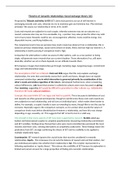Theories of romantic relationships: Social exchange theory (16)
Proposed by Thibault and Kelley (1959) SET claims that partners act out of self interest in
exchanging rewards and costs, whereby we try to maximise gain and minimise loss (The minimax
principle). We assess our relationship in terms of its ‘profit’.
Costs and rewards are subjective to each couple, whereby someone may see an outcome as a
reward, someone else may see it as unvaluable. E.g., a partner may value praise the other may wish
not to have praise. Rewards could be sex, encouragement, affection. Costs could be energy, less
disposable income, sacrificing hobbies etc.
The comparison level is how we perceive how much reward we deserve from a relationship, this is
based on previous relationships, social norms (shown in books, films) and how high our esteem is. A
relationship is worth pursuing if comparison level is high.
Comparison for alternatives is when we assess if other options, such as a new partner or being
single, will generate more rewards than our current situation. Those alternatives if so, will seem
desirable, whether we act on them depends on our attitude towards them.
SET proposes 4 stages that relationships go through. Sampling stage, bargaining stage, commitment
stage and institutionalised stage.
The assumptions of SET are criticised. Clark and Mills argue that this only explains exchange
relationships, the ones that consistently assess their ‘profit and losses, though does not explain
communal relationships, one in which interaction is governed primarily by consideration of the
other’s needs and wishes regardless of the return. (Developed) Furthermore, when considering
cultural differences, Lott found that women in collectivist cultures were more focussed on giving
than receiving, suggesting SET would be difficult to generalise to other cultures e.g., individualist,
Therefore SET holds cultural relativism.
Concepts discussed within SET are vague and hard to quantify. This is because its definitions of cost
and rewards are often general and imprecise, though in real life terms these costs and rewards are
very subjective to each relationship, and will vary on individual basis’, which makes them harder to
define. For example, a couple’s loyalty is seen as rewarding by many, though fthis is not the case for
everyone. Especially vague is the comparison concepts, as it is unclear what exactly the values of
comparison levels must before dissatisfaction threatens a relationship, and how this may change
depending on age, sexuality, etc. This suggests that SET is hard to test in a valid way.
One strength is that many aspects of SET have been supported by research. Kurdek asked gay,
lesbian and heterosexual couples to complete questionnaires measuring relationship commitment
and SET variables. Findings show that partners who were most committed also perceived the most
rewards and fewer costs, viewing alternatives as completely unattractive. These findings match the
predictions from SET, strongly confirming the theory of SET and its credibility to be applied to
multiple relationship types.
Counterpoint: SET research ignores the crucial factor that must be considered in romantic
relationships. Equity. This is because it is not only the balance of reward and cost that matters, but
also individual perception into whether their relationship is fair. This is better represented in a
following explanation as ‘equity theory’. This reduces the credibility of SET because its explanation is
limited and cannot account for a large proportion of finding into romantic relationships.





